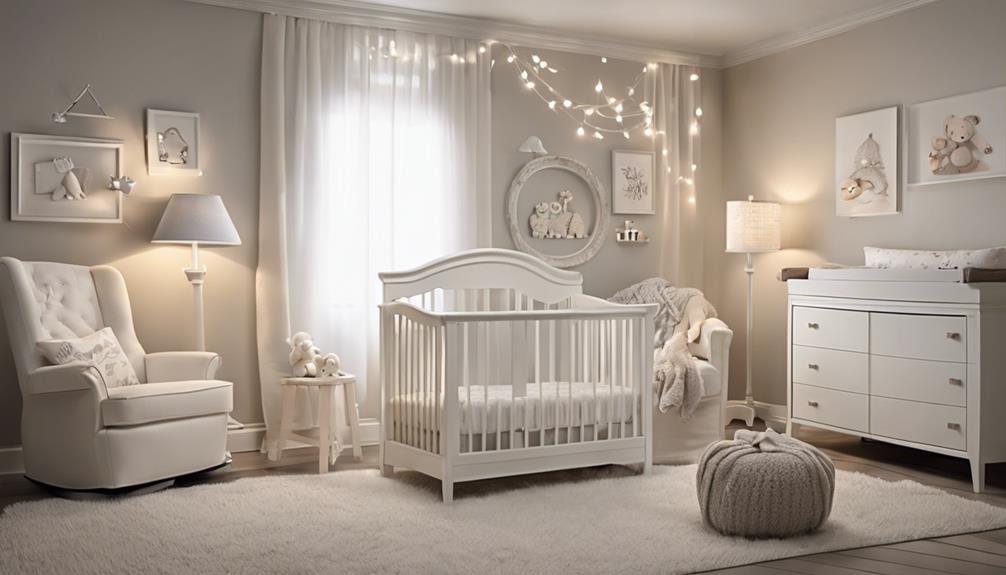As parents, we might not realize that the noises our newborn makes during sleep can hold valuable clues about their well-being.
Have you ever wondered how to distinguish between the normal sleep sounds and the ones that might require attention? Understanding these nuances can be a game-changer in ensuring a peaceful night for your baby.
Let's explore effective ways to address these noises and create a soothing environment that promotes restful sleep for both your little one and yourself.
Key Takeaways
- Understanding common newborn sleep noises aids in addressing and soothing them effectively.
- Creating a calming sleep environment with white noise promotes peaceful rest for babies.
- Consistent bedtime routines and gentle soothing techniques help manage newborn sleep noises.
- Monitoring sleep sounds helps in early identification of potential issues and establishes healthy sleep habits.
Understanding Newborn Sleep Noises
As new parents, we may find comfort in understanding the various sleep noises our newborns make, as these sounds are a natural part of their developing systems. Newborns produce an array of noises during sleep, including whistling, snorting, gurgling, and hiccupping. These noises can be attributed to their softer airways, faster breathing rates, and the occasional irregular breathing pattern typical during active REM sleep. While some of these sounds may seem concerning, they're usually harmless and part of the normal development process.
Monitoring these baby sleep noises is essential as it can help us identify any potential respiratory issues early on. Fast breathing, rhythmic grunting, or persistent whistling sounds may warrant further attention from healthcare providers. By recognizing and understanding these noises, we can provide a more soothing environment for our newborns, ensuring better sleep quality for both them and us as parents. Being informed about the range of sleep sounds our little ones make allows us to respond appropriately and provide the necessary care and reassurance they need.
Creating a Soothing Sleep Environment

Creating a soothing sleep environment for your newborn involves utilizing strategies such as dimming lights and using white noise machines to promote better rest. Newborns are sensitive to their surroundings, and a peaceful sleep environment can make a significant difference in their quality of sleep. Here are some tips to help you create a calming space for your little one:
- Dim the Lights: Lowering the intensity of lights in the room can signal to your baby that it's time to sleep, helping them relax and drift off more easily.
- Use White Noise Machines: White noise machines can provide a consistent background noise that masks sudden sounds, creating a cocoon of soothing sounds for your newborn.
- Minimize External Disturbances: Heavy curtains or blankets can help reduce external light and create a cozy atmosphere, promoting a deeper and more restful sleep for your baby.
Techniques for Calming Sleep Noises

To help your newborn achieve a peaceful sleep, implementing techniques for calming sleep noises can greatly enhance their restfulness and promote a more serene environment. Babies can be noisy sleepers, and understanding how to manage these sounds is critical for both their sleep habits and your peace of mind. One effective way to calm sleep noises is by using white noise machines, which can help drown out disruptive sounds, allowing for a more restful sleep for your little one during growth spurts or other times of increased activity. Establishing a consistent bedtime routine signals to your baby that it is time to sleep, potentially reducing sleep noises as they settle into a deep sleep. Additionally, placing sleep devices away from the baby's ears and keeping the volume low can prevent overstimulation from noise. Monitoring any dependency on sleep sounds is important to avoid future sleep issues, ensuring that your baby can peacefully drift off into dreamland.
| Technique | Description |
|---|---|
| White Noise Machines | Helps drown out disruptive sounds, promoting better rest for both baby and parents. |
| Consistent Bedtime Routine | Signals to the baby that it is time to sleep, potentially reducing sleep noises. |
| Volume Control | Keep sleep devices away from the baby's ears and maintain low volume to prevent overstimulation. |
Addressing Common Newborn Sleep Sounds

Understanding common newborn sleep sounds can be challenging yet rewarding for parents as they learn to distinguish between normal self-soothing noises and signs of distress. When it comes to addressing these noises, remembering that every little noise your sleeping baby makes has a reason behind it's crucial.
Here are some tips to help your baby and yourself get a good night's sleep:
- Stay Calm and Observant: Instead of immediately rushing to pick up your little one at the first sound, take a moment to observe and listen. Most of the time, babies are just settling themselves back to sleep.
- Create a Relaxing Environment: Establish a soothing sleep environment with dim lights, white noise, and a comfortable temperature to promote peaceful sleep for your newborn.
- Practice Gentle Soothing Techniques: If your baby seems a bit unsettled, try gentle techniques like patting, shushing, or offering a pacifier to help them relax and drift back to sleep.
Promoting Peaceful Sleep for Baby

Establishing a peaceful sleep routine for your baby is essential for their well-being and development. When it comes to promoting a restful environment for baby sleep, incorporating white noise can be a game-changer. White noise has the power to drown out disruptive sounds, creating a calming atmosphere that encourages better sleep for your little one.
Additionally, understanding the various newborn sleep sounds, such as whistling, gurgling, and snorting, can help alleviate any worries you may have about your baby's sleep patterns.
To further enhance your baby's sleep quality, consider implementing a calming bedtime routine. Consistency is key when it comes to establishing healthy sleep habits for your newborn. By incorporating soothing activities before bedtime and utilizing white noise machines, you can create a tranquil setting that signals to your baby that it's time to rest. Remember, a noise-free environment and a predictable routine can contribute to longer and more peaceful sleep for your baby.
Frequently Asked Questions
Why Does My Newborn Make so Many Noises While Sleeping?
It is clear why newborns make many sleep noises. Their tiny nasal passages and developing muscles lead to various sounds. Common noises like whistling, snorting, gurgling, and hiccupping are normal. Sometimes, these sounds indicate respiratory concerns, warranting white noise for better sleep.
How Do You Sleep Next to a Noisy Baby?
We've learned that sleeping near a noisy baby can be challenging. We recommend using white noise machines and bedside co-sleepers to help both of you rest better. Trust your instincts to know when your baby truly needs attention.
Why Does My Baby Grunt and Squirm All Night?
We've noticed that babies often grunt and squirm all night due to their developing digestive and respiratory systems. Grunting helps move gas, while squirming helps them find comfort. It's a normal part of their adjustment.
How Do I Stop My Baby From Grunting at Night?
We've learned that newborns often grunt during sleep due to normal bodily processes. Addressing this may involve gentle techniques like adjusting sleep positions, ensuring a cozy sleep environment, and monitoring for any signs of discomfort or distress.
Conclusion
To summarize, it's crucial to address noises during your newborn's sleep to promote a peaceful environment.
By understanding and managing common sleep sounds, creating a soothing sleep space, and utilizing calming techniques, you can help your baby rest better.
Remember, a little noise is normal, but too much can disrupt their sleep. So, embrace the irony of needing noise to drown out noise, and may you both enjoy a restful night's sleep.









